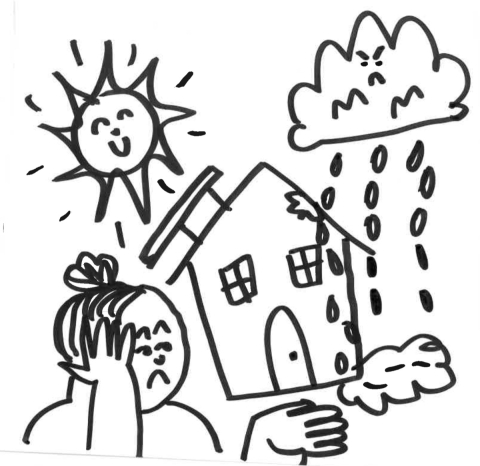24 months in a leaky house!

Sally is a woman in her 70’s living in a retirement village in Victoria’s North. Sally contacted HAAG’s Retirement Housing Advice Service (RHAS) in late 2021 after 18 months of attempting to resolve an issue with her leaking roof by herself. Sally originally reported to management her roof was leaking in 2020 after she noticed that her ceiling was damp, and water stained. It was discovered that the roof tiles were cracked, but rather than replace the cracked tiles, management made the decision to try and repair the cracked tiles with over-the-counter glue. Due to this cost cutting remedy, Sally had to deal with two more incidents of a leaking roof, that continued to damage her unit and cause her great stress. She spoke with the maintenance worker after the third leak, and he made it clear to her that the village was going to avoid repairing the tiles for as long as they could. After so long working to resolve the same issue Sally was stressed and frustrated to the point where it was affecting her physical health.
Sally’s case was picked up by a RHAS worker who initially made contact with the village in November 2021. The worker had trouble getting in touch with any village staff as they regularly did not check their emails, answer their phone or respond to messages. When the worker eventually got in touch, village staff stated they were organising roofing quotes and claimed that they were waiting on trades people and that was the hold up. This seemed unreasonable given that they had known about the issue since 2020.
The RHAS worker contacted village staff on almost a weekly basis to no avail. In August 2022, Sally, with the support of her worker submitted a Victorian Civil and Administrative Tribuanl (VCAT) application to put pressure on the village to fix the roof before another rainy winter came around! Even with the VCAT application looming the village continued to drag their feet. Sally’s RHAS worker had to keep the pressure on with consistent follow up communication and unmet deadlines from the village. Eventually the roof was repaired, but it was not time to relax and celebrate yet!
To fix the roof, the village had to remove Sally’s solar panels and an air conditioning inverter. Sally and the village had agreed to pay half the inverter relocation each. When they had fixed the roof it was their job to put everything back in working order. Unsurprisingly, this did not happen promptly. After a bit more prodding, 2 days before the VCAT hearing the village ‘miraculously’ managed to have the solar panels working again!
Finally in February 2023, Sally’s roof was leak free, her solar panels working and her case closed!
Sally was dealing with this issue herself for 18 months, and then for another almost 18 months with the support of HAAG. This is too long for villages not to act on a health and safety issue, but sadly this kind of behavior is common. Sally reported that she thinks the VCAT application really prompted the village to “pull their finger out” and even to undertake roof replacements for other residents in the village.
This case study illustrates the need for RHAS support so residents don’t have to go up against unreasonable and unwilling village staff alone in both internal and external dispute resolution processes, and also highlights the pressure placed strong and outspoken residents who speak out for themselves and others to protect their housing rights!
*names and other identifying features in this casestudy have been changed


 "There is nothing like staying at home for real comfort."
"There is nothing like staying at home for real comfort."